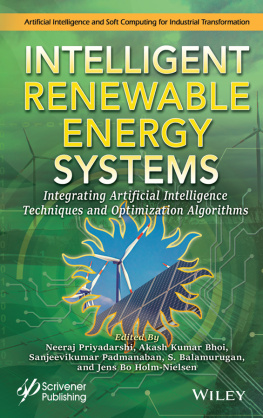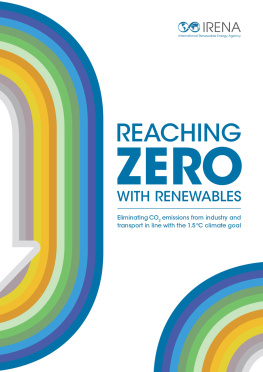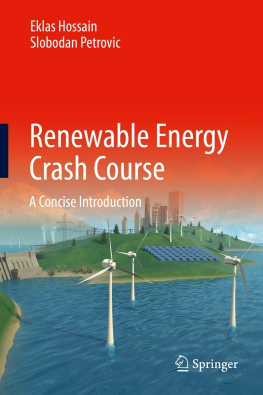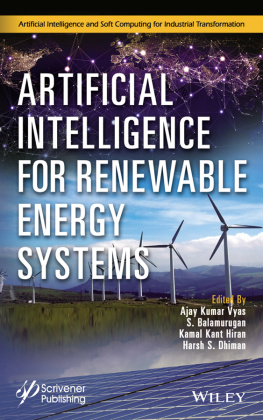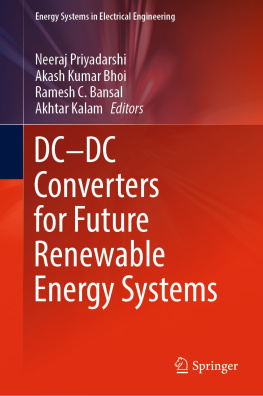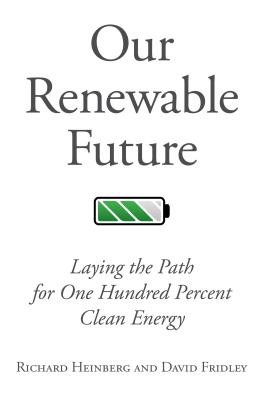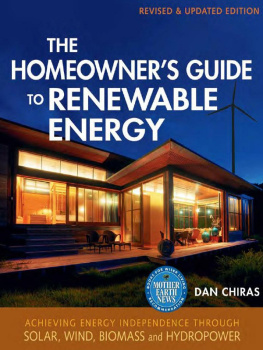Priyadarshi Neeraj - Intelligent Renewable Energy Systems
Here you can read online Priyadarshi Neeraj - Intelligent Renewable Energy Systems full text of the book (entire story) in english for free. Download pdf and epub, get meaning, cover and reviews about this ebook. year: 2021, publisher: John Wiley & Sons, Incorporated, genre: Romance novel. Description of the work, (preface) as well as reviews are available. Best literature library LitArk.com created for fans of good reading and offers a wide selection of genres:
Romance novel
Science fiction
Adventure
Detective
Science
History
Home and family
Prose
Art
Politics
Computer
Non-fiction
Religion
Business
Children
Humor
Choose a favorite category and find really read worthwhile books. Enjoy immersion in the world of imagination, feel the emotions of the characters or learn something new for yourself, make an fascinating discovery.
- Book:Intelligent Renewable Energy Systems
- Author:
- Publisher:John Wiley & Sons, Incorporated
- Genre:
- Year:2021
- Rating:3 / 5
- Favourites:Add to favourites
- Your mark:
- 60
- 1
- 2
- 3
- 4
- 5
Intelligent Renewable Energy Systems: summary, description and annotation
We offer to read an annotation, description, summary or preface (depends on what the author of the book "Intelligent Renewable Energy Systems" wrote himself). If you haven't found the necessary information about the book — write in the comments, we will try to find it.
Intelligent Renewable Energy Systems — read online for free the complete book (whole text) full work
Below is the text of the book, divided by pages. System saving the place of the last page read, allows you to conveniently read the book "Intelligent Renewable Energy Systems" online for free, without having to search again every time where you left off. Put a bookmark, and you can go to the page where you finished reading at any time.
Font size:
Interval:
Bookmark:

Scrivener Publishing
100 Cummings Center, Suite 541J
Beverly, MA 01915-6106
Artificial Intelligence and Soft Computing for Industrial Transformation
Series Editor: Dr S. Balamurugan ()
Scope: Artificial Intelligence and Soft Computing Techniques play an impeccable role in industrial transformation. The topics to be covered in this book series include Artificial Intelligence, Machine Learning, Deep Learning, Neural Networks, Fuzzy Logic, Genetic Algorithms, Particle Swarm Optimization, Evolutionary Algorithms, Nature Inspired Algorithms, Simulated Annealing, Metaheuristics, Cuckoo Search, Firefly Optimization, Bio-inspired Algorithms, Ant Colony Optimization, Heuristic Search Techniques, Reinforcement Learning, Inductive Learning, Statistical Learning, Supervised and Unsupervised Learning, Association Learning and Clustering, Reasoning, Support Vector Machine, Differential Evolution Algorithms, Expert Systems, Neuro Fuzzy Hybrid Systems, Genetic Neuro Hybrid Systems, Genetic Fuzzy Hybrid Systems and other Hybridized Soft Computing Techniques and their applications for Industrial Transformation. The book series is aimed to provide comprehensive handbooks and reference books for the benefit of scientists, research scholars, students and industry professional working towards next generation industrial transformation.
Publishers at Scrivener
Martin Scrivener ()
Phillip Carmical ()
Edited by
Neeraj Priyadarshi
Akash Kumar Bhoi
Sanjeevikumar Padmanaban
S. Balamurugan
and
Jens Bo Holm-Nielsen

This edition first published 2022 by John Wiley & Sons, Inc., 111 River Street, Hoboken, NJ 07030, USA and Scrivener Publishing LLC, 100 Cummings Center, Suite 541J, Beverly, MA 01915, USA
2022 Scrivener Publishing LLC
For more information about Scrivener publications please visit www.scrivenerpublishing.com.
All rights reserved. No part of this publication may be reproduced, stored in a retrieval system, or transmitted, in any form or by any means, electronic, mechanical, photocopying, recording, or otherwise, except as permitted by law. Advice on how to obtain permission to reuse material from this title is available at http://www.wiley.com/go/permissions.
Wiley Global Headquarters
111 River Street, Hoboken, NJ 07030, USA
For details of our global editorial offices, customer services, and more information about Wiley products visit us at www.wiley.com.
Limit of Liability/Disclaimer of Warranty
While the publisher and authors have used their best efforts in preparing this work, they make no representations or warranties with respect to the accuracy or completeness of the contents of this work and specifically disclaim all warranties, including without limitation any implied warranties of merchant-ability or fitness for a particular purpose. No warranty may be created or extended by sales representatives, written sales materials, or promotional statements for this work. The fact that an organization, website, or product is referred to in this work as a citation and/or potential source of further information does not mean that the publisher and authors endorse the information or services the organization, website, or product may provide or recommendations it may make. This work is sold with the understanding that the publisher is not engaged in rendering professional services. The advice and strategies contained herein may not be suitable for your situation. You should consult with a specialist where appropriate. Neither the publisher nor authors shall be liable for any loss of profit or any other commercial damages, including but not limited to special, incidental, consequential, or other damages. Further, readers should be aware that websites listed in this work may have changed or disappeared between when this work was written and when it is read.
Library of Congress Cataloging-in-Publication Data
ISBN 978-1-119-78627-6
Cover image: Pixabay.com
Cover design by Russell Richardson
Set in size of 11pt and Minion Pro by Manila Typesetting Company, Makati, Philippines
Printed in the USA
10 9 8 7 6 5 4 3 2 1
This book presents intelligent renewable energy systems integrating artificial intelligence techniques and optimization algorithms. The first chapter describes placement of distributed generation (DG) sources including renewable distributed generation (RDGs) such as biomass, solar PV, and shunt capacitor has been considered for the study purpose. The second chapter develops a new approach to chaotic particle swarm optimization (CPSO) technique. In the third chapter, comprehensive reviews of different artificial intelligence and machine learning techniques have been explicated. To bring out its advantages over other methods used in island detection, the traditional methods are first explained and then compared with artificial intelligence and machine learning island detection techniques. The performance of the intelligent controller is found to be good under steady conditions for grid connected photovoltaic systems and has been discussed in chapter four. Chapter five explains various uses of Genetic Algorithms (GA) and Solar PV forecasting are described; further, many stimulated algorithms which have been used in optimization, controlling, and methods of supervising of power for renewable energy analysis, which include hybrid power generation strategies are discussed. Chapter six presents the integration of 100 kW solar PV source to the 25 kV AC grid by using generalized r-s based SVPWM algorithm. Chapter seven aims to discuss the idea of hybrid system configuration, dynamic modeling, energy management, and control strategies. A multi-stage planning framework is proposed in chapter eight to divide the planning period into several stages so that investments can be made in each stage as per the requirements. A unique and a novel GUI is presented to design the entire solar PV systems has been discussed in Chapter nine. Chapter ten addresses micro-grid situational awareness using micro PMU. Role of AI & ML in smart grid entities such as Home Energy Management System (HEMS), Energy Trading, Adaptive Protection, Load Forecasting and Smart Energy Meter are presented in Chapter eleven. Chapter twelve presents a new method for energy loss allocation in radial distribution network (RDN) with distributed generationin the context of deregulated power system. Chapter thirteen presents the optimization of controller parameters for FACTS and VSC based HVDC. Chapter fourteen describes Short Term load forecasting for a Captive Power Plant Using Artificial Neural Network. Chapter fifteen defines Real-time EV Charging Station Scheduling Scheme by using Global Aggregator.
Neeraj Priyadarshi
Akash Kumar Bhoi
Sanjeevikumar Padmanaban
S. Balamurugan
Jens Bo Holm-Nielsen
Editors
Optimization Algorithm for Renewable Energy Integration
Bikash Das
Department of Electrical Engineering, Govt. College of Engineering and Textile Technology, Berhampore, West Bengal, India
Department of Electrical and Electronics Engineering, Birla Institute of Technology and Science Pilani, K. K. Birla Goa Campus, Goa, India
Department of Electrical Engineering, Indian Institute of Technology, Kharagpur, West Bengal, India
Department of Electrical Engineering, Indian Institute of Technology (Indian School of Mines), Dhanbad, Jharkhand, India
Font size:
Interval:
Bookmark:
Similar books «Intelligent Renewable Energy Systems»
Look at similar books to Intelligent Renewable Energy Systems. We have selected literature similar in name and meaning in the hope of providing readers with more options to find new, interesting, not yet read works.
Discussion, reviews of the book Intelligent Renewable Energy Systems and just readers' own opinions. Leave your comments, write what you think about the work, its meaning or the main characters. Specify what exactly you liked and what you didn't like, and why you think so.

